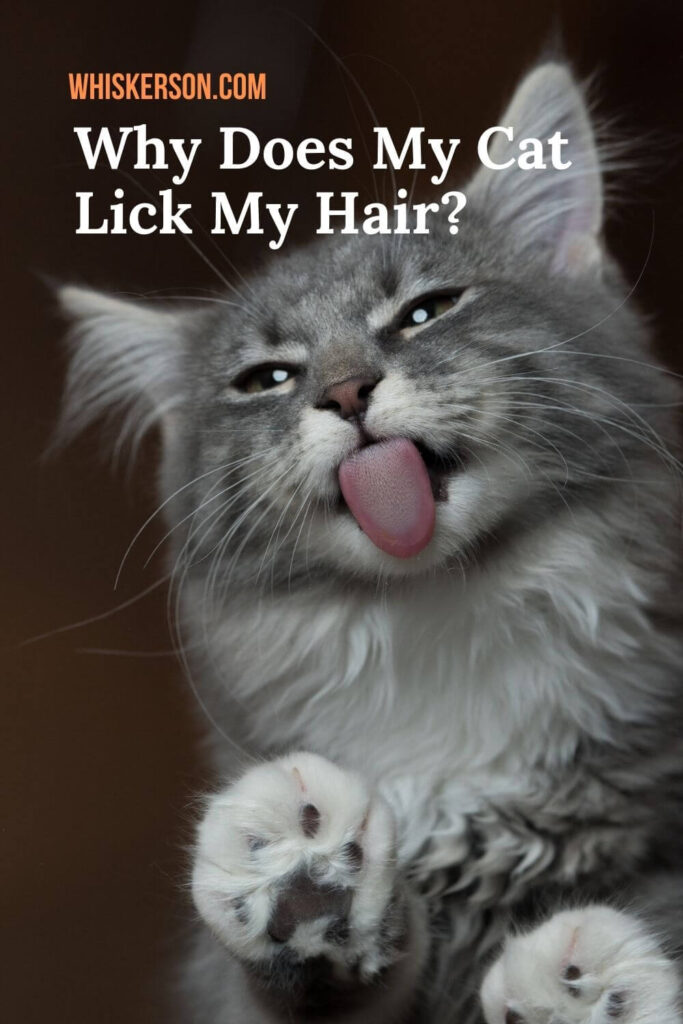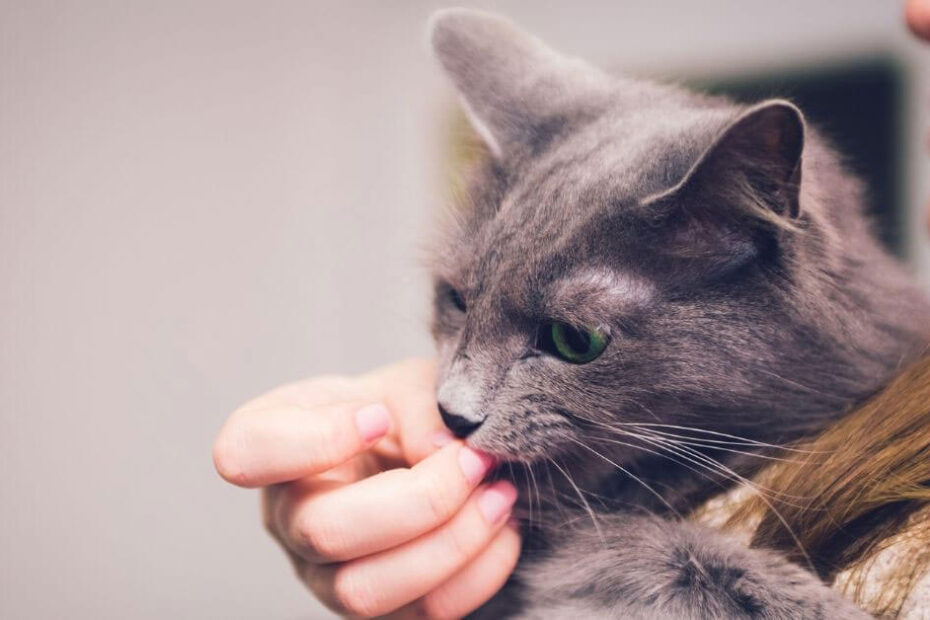There are plenty of good explanations ‘Why Your Cat Licks Your Hair’ including to show you affection, to mark their territory, to clean you, because they’re stressed among many others. While it might be strange, more often than not, they’re trying to show you affection.

If, like us, you’ve sat and wondered “why is my cat licking my hair?” then you’re not alone.
In this article, we’ll explore some of the possible explanations as to why your cat is displaying this behavior.
You might think this behavior is cute or you might be shocked.
Let’s get into it!
Reason 1: To Show You They Love You
Cats don’t only use licking as a way to clean themselves; they use it to show love and affection too! By licking your hair, it’s likely your cat is attempting to create a connection.
Some of this behavior stems from when your cat was young. Their mother would have licked them as a kitten to clean them and show them how much they love them.
You’ll find that a lot of cats do this right up until they’re an adult as a way to show you that they love you too.
Reason 2: To Mark Their Territory
Licking is one of the main ways your cat will try to mark its territory. Despite there being plenty of other ways they can do this, licking is extremely common.
When your cat sees you as theirs, they will lick your hair as a way to let other cats know they own you.
Despite this behavior being entirely normal in cats, if you own more than one cat or another pet in your house, it can cause problems as your pets may start to get aggressive against one another if they both think they own you!
Reason 3: To Clean You
Despite your cat not understanding that licking your hair isn’t really helping you clean yourself, this behavior is totally normal to your cat.
As we discussed above, your cat’s mother will have groomed your cat as a kitten to keep them clean and let them learn how to do it themselves, so it’s very likely they are trying to pass this trait on to you.
Reason 4: Because They’re Lonely
Cats lick each other as a way to create social bonds. It’s one of their favorite ways to play with other Cats as it allows them to establish who their pack is.
When a Cat feels lonely, it will often groom or play. If you are away from home regularly with work, it’s possible that your cat just wants more bonding time, and they will do this by grooming you (licking your hair).
Reason 5: Because They’re Stressed or Anxious
If you notice your cat excessively licking your hair, themselves, or other objects, it can be a warning sign of a stressed or anxious cat.
Stress and anxiety are most commonly found amongst indoor cats, primarily because they get less exercise and stimulation than outdoor cats; however, outdoor cats can have bouts of stress and anxiety if something significant in your life has changed, such as moving home.
This type of licking isn’t anything to worry about and will often go away by itself. Still, if you start to notice sores on your cat’s skin or bald spots, you should consult your local veterinarian about how you can cure this behavior.
Reason 6: To Taste Something Delicious
As ridiculous as it sounds, your cat could be licking your hair because they can smell something exciting and tasty on you.
It might be your shampoo, the smell of dinner, or if you’ve been exercising, sweat! So it’s very likely your cat is attempting to try for themselves.
On the other hand, however, your cat might be trying to lick your hair because they don’t like what they smell on you and believe you need a bath!
Now that we’ve explained why your cat might lick your hair, you undoubtedly have some follow-up questions such as “is my cat licking my hair bad for them?” and “why does it hurt when my cat licks my hair?” Below we will dive deeper into these questions.
FAQ – About Cats Licking Hair
Is my cat licking my hair bad for them?
You’re likely wondering whether it’s ok for your cat to lick your hair. Generally, it’s not harmful to your feline to lick your hair. It’s extremely unlikely that they would swallow enough to cause hairballs, and, even if they did ingest some, cats’ stomachs are designed to digest fur.
For you, on the other hand, it can pose more of a risk. As cats have rough tongues, which allow them to remove any nasties from their fur, when they lick your hair, they may also pull it and break hair as they groom you.
This can lead to irritation of the scalp, and in some bad cases, may even lead to bald patches. Additionally, your cat’s saliva is full of bacteria which can cause you to get ill – especially if your cat is fed on a raw diet.
Why is it painful when my cat licks my hair?
It might occasionally hurt when your cat licks your hair, especially if they do this a lot. This is because cat’s tongues are pretty rough.
Their tongues are covered in tiny little hooks called papillae. These little hooks (papillae) are made from the same stuff cats’ claws are made from (keratin) and are shaped like barbs.
The sharp barbs on your cat’s tongue are important as they allow your cat to effectively clean their coat – removing any nasty substances – and help them remove any flesh and bones in their food.
Hence, when your cat licks your hair and brushes its tongue across your hair, it can be a little painful and start to pull.
Should I be concerned about how often my cat licks my hair?
Unless your furry friend is constantly licking your hair or grooming itself to the point of bald patches, licking isn’t typically something to be concerned about. If anything, it’s natural amongst cats.
Nonetheless, with how rough your cat’s tongue can be, it can get pretty frustrating if they regularly lick your hair.
If you’re searching for a way to have your cat stop licking your hair, one of the best techniques you can use is the distraction technique. Below, we list a few fantastic techniques to help take your cats’ attention off your hair!
How can I make my cat stop licking my hair?
If your cat is constantly licking your hair or grooming itself excessively, licking isn’t typically something you should worry about. In fact, it’s incredibly natural for your cat to do this. Nonetheless, with how rough a cat’s tongue is, it can get frustrating if they regularly lick you.
While many of us enjoy the occasional bit of grooming from our cats, it can get frustrating if it’s becoming too much of a regular occurrence. If you’re searching for a way to discourage your cat from licking your hair, one of the top things you can try is to distract them.
You can do this by playing with them to take their attention elsewhere, or you might even pet them, giving them plenty of cuddles in the process. Distracting your cat by interacting with them will make your cat feel loved and as though you want to spend time with them.
Another good way to distract your cat is with food – you can do this by giving them a tasty treat. We recommend distracting your cat first by playing with them and then rewarding them with a little treat instead of distracting them straight away with food, as this could encourage them to lick you more!
If all of those techniques prove unsuccessful and your furry friend still likes to lick your hair regularly, then your last point of call is to move away from your cat or ignore them for a short while. By ignoring them, it shows your cat that you aren’t willing to entertain their behavior and that it is unacceptable. Your cat will soon understand that licking your hair is something you don’t like and should stop doing it.
Although, if they’re trying to get you out of the house, then they might do this to get you to move!
Final Thought
While there are several heart-warming reasons behind why your cat licks your hair, none of those will lead to healthy and luscious locks in the long run, especially if your cat starts doing this regularly.
When your cats’ grooming gets a little too much, distract them with some of the techniques we listed above.
Remember: never reprimand or punish your cat for doing something that comes naturally, as this could lead to a poor relationship with your cat. Instead, show them that you understand and redirect their licking behavior towards other, more positive things.
